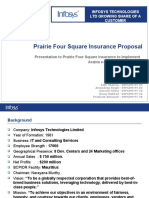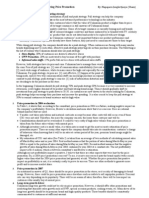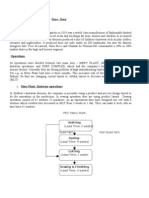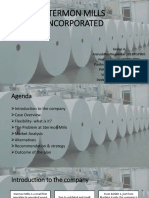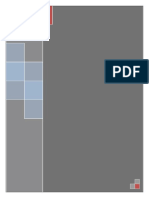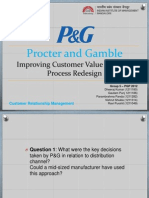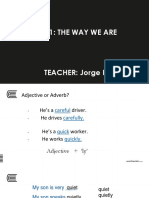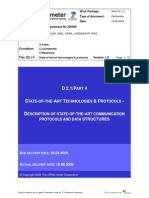100%(4)100% found this document useful (4 votes)
1K viewsNypro
Nypro
Uploaded by
Karthik ArumughamNypro manages innovation through an internal market system of independent plants that compete for rewards like stock options. This spurs continuous improvement and innovation. CEO Lankton follows guidelines like developing advanced technology, standardizing processes, creating innovative teams, and rewarding performance. Regarding adopting the Novoplast machine, the best option is a partial Option 2 - installing a few machines in innovative plants to test feasibility before a full rollout. This balances consistency with exploring the technology's potential to capture new markets.
Copyright:
© All Rights Reserved
Available Formats
Download as DOCX, PDF, TXT or read online from Scribd
Nypro
Nypro
Uploaded by
Karthik Arumugham100%(4)100% found this document useful (4 votes)
1K views3 pagesNypro manages innovation through an internal market system of independent plants that compete for rewards like stock options. This spurs continuous improvement and innovation. CEO Lankton follows guidelines like developing advanced technology, standardizing processes, creating innovative teams, and rewarding performance. Regarding adopting the Novoplast machine, the best option is a partial Option 2 - installing a few machines in innovative plants to test feasibility before a full rollout. This balances consistency with exploring the technology's potential to capture new markets.
Original Description:
Nypro
Copyright
© © All Rights Reserved
Available Formats
DOCX, PDF, TXT or read online from Scribd
Share this document
Did you find this document useful?
Is this content inappropriate?
Nypro manages innovation through an internal market system of independent plants that compete for rewards like stock options. This spurs continuous improvement and innovation. CEO Lankton follows guidelines like developing advanced technology, standardizing processes, creating innovative teams, and rewarding performance. Regarding adopting the Novoplast machine, the best option is a partial Option 2 - installing a few machines in innovative plants to test feasibility before a full rollout. This balances consistency with exploring the technology's potential to capture new markets.
Copyright:
© All Rights Reserved
Available Formats
Download as DOCX, PDF, TXT or read online from Scribd
Download as docx, pdf, or txt
100%(4)100% found this document useful (4 votes)
1K views3 pagesNypro
Nypro
Uploaded by
Karthik ArumughamNypro manages innovation through an internal market system of independent plants that compete for rewards like stock options. This spurs continuous improvement and innovation. CEO Lankton follows guidelines like developing advanced technology, standardizing processes, creating innovative teams, and rewarding performance. Regarding adopting the Novoplast machine, the best option is a partial Option 2 - installing a few machines in innovative plants to test feasibility before a full rollout. This balances consistency with exploring the technology's potential to capture new markets.
Copyright:
© All Rights Reserved
Available Formats
Download as DOCX, PDF, TXT or read online from Scribd
Download as docx, pdf, or txt
You are on page 1of 3
Karthik Arumugham (1311299)
Managing Innovation at Nypro, Inc.
1. How does Nypros market for innovation function? How is it managed?
Distinct sectors, independent work: The internal market for innovation at Nypro is based on separate
distinct sectors which work independently to establish themselves as the companys best manufacturing
plant. Nypro wanted its workers to harness their innovative spirits and improve the companys overall
production.
Incentives: Each independent plant, motivated by company offered stock options, seeks to improve
productivity, efficiency and innovation in the work area on a continual basis. The employees of each
plant wanted to be the best so they could receive the offered stock options.
Internal competition: Through the creation of an internal competition between plants, Nypro
management helped to eliminate complacency and stagnation. The plants compete against each other
for the top ranking. By constantly improving their systems, the plants improve the company as a whole.
Creating an internal competition, which is driven by money, is good way to stir both innovation and
encourage employee loyalty.
Employee satisfaction: By encouraging employees to be successful, the company in turn was rewarded
with a happy staff that was continually looking for ways to better improve the company. The continued
profitability of Nypro was furthered out of a competitive attitude and desire to be the best.
Four Steps:
o Find the actual occurrences of process innovations.
o Select the most important innovations which can be implemented in other plants.
o Find the ways to transfer the innovation from the original team to other teams and plants.
o Nypro sets up the new rules of the innovation.
2. What is Lanktons mental model (way of thinking)?
Lanktons managing process at Nypro followed five specific guidelines/strategies:
Developing superior technology: Focus on large-scale molding jobs with demanding, technologically
progressive customers. Nypro was able to become the fifth largest plastic molder in the United States
under this approach.
The standardizing of processes and offerings: Any potential customer, regardless of Nypros location in
the world, would have the same opportunities and offerings to product creation that another customer
might have in a different location. This process was achieved by the individual organizations reporting
their successes and failures in the production process, so other organizations around the world would
know how to handle a similar situation if it arises.
Creating a proactive and innovative environment: Clearly Nypros different locations around the world
would have customers that want different products. So while differentiation is difficult to achieve, the
different Nypro locations were able to share their thoughts, processes, and innovative applications, which
helped the organization to overcome this challenge.
Rewarding employee performance: Proactive and innovative people were encouraged to stay at Nypro,
allowing the organization to maintain those components/employees which made them successful. This
process was accomplished by installing an incentive-based reward system, which provided employees
with stock options based on years of service, pay level, and performance ratings. These employees (who
became stockholders) would be responsible for selecting the board of directors.
Customer-oriented operations: Focus on managing their customer relationships by establishing teams
that focused on the product development and process improvement issues for each customer-specific
project. These teams were comprised of individuals from various disciplines, as well as different
organizations made-up of the customers organization and Nypro personnel. Teams were then created to
focus on different aspects of the development and production processes.
Development Team for each project
o Engineering Program Manager
o Variety on Team
o Customers Engineers
o Responsible for product idea and process innovation
Karthik Arumugham (1311299)
CIT (Continuous improvement) Team
o Manufacturing, Quality Control, Materials procurement, Marketing
o Customer reps & suppliers
o Responsible for continuous improvement as long as product is under production
These teams allowed for innovative steps and processes to be continually developed during all aspects of
the product/process creation and production, while focusing on improving each step. If teams became
stagnant in their innovative process, Nypro management would change some of their people to offer a
different perspective and possibly stimulate advances in the processes.
Organization structure conducive for innovation: Each plant is a company with board of directors
composed of managers from other facilities. Board supports General Manager of Plant. Sales is
centralized reporting to headquarters with dotted line reporting to GM of each plant.
o Innovation Centric Formal structure
Plant managers or departments approach management
Management reviews and makes decision
If approved the idea spreads across company
E.g. Visual Factory, MRP2 system, reduced tooling supplier lead time
o Informal Structure (Bottom Up)
Plant Managers have the authority to implement ideas
If successfully idea spreads across company
E.g. clean room manufacturing
Benchmarking: Lankton would judge performance results of all divisions throughout the company by
making comparisons of the teams/units and not the individuals. Quarterly plant performance reports were
analyzed at annual management meetings.
3. What are the alternatives before Nypro regarding adopting Novoplast? What should they do?
The three options that Gordon Lankton (CEO) had for building a profitable business with Novaplast to
produce a wide variety of products in smaller volumes are,
1) Build a new plant with Novaplast machines whose sole business would be to pursue the sort of high-
variety, low-volume-per-part business for which the machine was designed.
2) Install two or three Novaplast machines in each plant in the Nypro system. Assign several engineers
and salespeople to work on the job of figuring out how the machine could be exploited most
profitably.
3) Assigning one plant to build a business around the Novaplast and then to learn from that plants
experience to roll out the machine across the company.
4) Dont adopt Novaplast.
Option#1:
Strengths Weaknesses
Most popular with senior management
Engineering efficiency
Centralizing development would facilitate
personal oversight of project
Quick execution
Transportation costs
Against current philosophy of being
decentralized
No successful experience
Option#2:
Strengths Weaknesses
Close-to-customer manufacturing particularly
important in the market segment
Allows for the pontential to capture more
market share
Puts more engineers and marketers to work on
exploiting the NovaPlast
Against economy of scale philosophy
Unproven technology and no clear indication
of its feasibility
Karthik Arumugham (1311299)
Better technology would emerge
Option#3:
Strengths Weaknesses
Could be implemented rather quickly
Allow for engineering/efficiency to be
gathered
Could evaluate how resource planning systems
interoperate
Use internal market for innovation
Time consuming to deploy if research shows
that the flexibility is required in other
international markets
Option#4:
Strengths Weaknesses
The niche market identified and capability
allows company to compete in market
Avoids taking advantage of the strengths,
innovation
Not dealing with problem of the changing
market and competition
The recommendation would be to go for a partial option #2, of installing two or three Novaplast machines
in a few of the most innovative plants. This is to ensure that consistency is not lost across plants due to
innovation. The roll out has to be done almost immediately as they need to quote shorter delivery times to
capture market and do away with time involved in non-value added activities such as changing molds, etc. If
successful then the new machines can be rolled out to the other plants.
Lanktons belief: This solution would be in line with Lanktons belief that no one in the company could
foresee which process innovations to be adopted companywide. This would allow him to explore more on
where, whether and how the machine would help Nypro before making large commitments to the
technology.
Compatibility: The smaller injection molds would be able to work along with the larger injection molds,
by downsizing some of the production parts/processes. So the new machines neednt wait for new
customer orders, but can actually co-exist in the Nypro ecosystem by contributing to the existing capacity.
Test Bench/Rapid Prototyping: Moreover these new machines would also act a test bench or for Rapid
Prototyping for the plant managers to experiment, if they didnt need to commit to a new type of
equipment before their customers accepted.
Machine Characteristics: As per Exhibit #4: Characteristics of shorter lead time, just in time deliveries,
cost effectiveness, ramp-up to high volume production, 24x7 operations, etc would lead to creating new
market segments in the low volume and high variety products business. As per Exhibit #5, the capital and
operational costs of Novaplast are significantly lower which would enable them to deliver parts to their
customers at competitive prices and at shorter notice.
Diversification into new products and markets: By installing two or three Novaplast machines in few
of the most innovative plants would give them access to a wide and diverse customer base such as in
healthcare, electronics, telecommunications, automotive, consumer and industrial products. They can also
experiment with existing products to see if they can improve the performance or receive new orders from
customers for low volume and high variety products. This would enable the growth needed to sustain and
also retain the engineers.
Performance Metrics: If the individual plants are measured based on metrics such as ROA, depreciation,
etc, then the corporate office could take the asset ownership and in turn rent out the new machines to the
plants, thereby not interfering with the performance metrics of the plants. But in the other cases the new
machines would be an asset and affect the performance metrics.
Flexibility: In adverse cases of the new machines not contributing to margins or unable to find suitable
customers in a specific region, the managers could return/send the machines to the other locations which
requires additional capacity, thereby serving as a risk cover.
You might also like
- Oxford Textbook of Medicine 6th Edition Volume 1 2020Document1,905 pagesOxford Textbook of Medicine 6th Edition Volume 1 2020Valentin Rotaru100% (20)
- Gillette vs. EnergizerDocument5 pagesGillette vs. EnergizerAshish Singh RainuNo ratings yet
- Marriott Hotels CRMDocument10 pagesMarriott Hotels CRMKarthik Arumugham100% (1)
- Case Analysis - Managing Innovation at Nypro - Group EDocument8 pagesCase Analysis - Managing Innovation at Nypro - Group Enamita_jain1608100% (4)
- Ducati Case: The Making of A Grand Prix MotorcycleDocument3 pagesDucati Case: The Making of A Grand Prix Motorcyclehagar sudhaNo ratings yet
- MGEC02 Topics in Price Theory (Intermediate Microeconomics II) Summer 2020Document5 pagesMGEC02 Topics in Price Theory (Intermediate Microeconomics II) Summer 2020Mick MendozaNo ratings yet
- Advantage Dell - Relative Cost AnalysisDocument2 pagesAdvantage Dell - Relative Cost AnalysisLokesh Sharma0% (1)
- Solutions Balancing Process Capacity Simulation Challenge 1 and Challange 2Document29 pagesSolutions Balancing Process Capacity Simulation Challenge 1 and Challange 2Mariam AlraeesiNo ratings yet
- Managing Innovation at Nypro, Inc. (A)Document13 pagesManaging Innovation at Nypro, Inc. (A)GibreelChamchaNo ratings yet
- Capstone Simulation: Strategy For Your CompanyDocument17 pagesCapstone Simulation: Strategy For Your Companyadivitya100% (6)
- Midterm Exam AnswersDocument8 pagesMidterm Exam AnswersJ100% (1)
- Global Wine War 2009Document8 pagesGlobal Wine War 2009serapNo ratings yet
- Digitalthink Group 2Document9 pagesDigitalthink Group 2Deepak DamonNo ratings yet
- Case Study Analysis TIMDocument6 pagesCase Study Analysis TIMTanumoy SarkarNo ratings yet
- Northern Chemical Company: Business MarketingDocument9 pagesNorthern Chemical Company: Business MarketingEshan GuptaNo ratings yet
- OMS 6072: Managing Technologies in The Supply Chain (4 Credits)Document16 pagesOMS 6072: Managing Technologies in The Supply Chain (4 Credits)Ema Tria WNo ratings yet
- HCCHDocument4 pagesHCCHKarthik ArumughamNo ratings yet
- SCMDocument20 pagesSCMKarthik ArumughamNo ratings yet
- Team TurmoilDocument3 pagesTeam TurmoilKarthik ArumughamNo ratings yet
- Supply Chain ManagementDocument15 pagesSupply Chain ManagementKarthik Arumugham100% (2)
- Nypro Case StudyDocument8 pagesNypro Case StudyTalhaNo ratings yet
- Os Case Study Analysis: Managing Innovation at Nypro IncDocument8 pagesOs Case Study Analysis: Managing Innovation at Nypro IncVibhuti BatraNo ratings yet
- Nypro IncDocument13 pagesNypro IncRendy Fadhlan PutraNo ratings yet
- Group 2 Michigan Manufacturing CorporationDocument22 pagesGroup 2 Michigan Manufacturing CorporationtheplacementcircleNo ratings yet
- Transcript of Hewlett-Packard: The Flight of The Kittyhawk: Target MarketDocument7 pagesTranscript of Hewlett-Packard: The Flight of The Kittyhawk: Target Marketprerna004No ratings yet
- Innovation at NyproDocument12 pagesInnovation at NyproMadan Kumar100% (1)
- Sai CoatingDocument13 pagesSai CoatingUday Deogam100% (1)
- BA363 Le Petit Chef Case AnalysisDocument2 pagesBA363 Le Petit Chef Case AnalysisAdisorn SribuaNo ratings yet
- Lucent Technologies CaseDocument9 pagesLucent Technologies CaseAndy VibgyorNo ratings yet
- How Does The Internal Market For Innovation at Nypro FunctionDocument2 pagesHow Does The Internal Market For Innovation at Nypro Functionprerna004No ratings yet
- Bergerac Systems: The Challenge of Backward Integration: Group 02, Section - CDocument5 pagesBergerac Systems: The Challenge of Backward Integration: Group 02, Section - CSaumya GautamNo ratings yet
- Kunst 1600 CANDocument6 pagesKunst 1600 CANRaghavendra AnnaNo ratings yet
- SecA Group8 CaseMichiganManufacturingCorpDocument7 pagesSecA Group8 CaseMichiganManufacturingCorpSuyash LoiwalNo ratings yet
- (C3) Le Petit ChefDocument33 pages(C3) Le Petit ChefShaili DesaiNo ratings yet
- HP Printers A Perspective On The Marketing Strategies of HP Printers) Iipm Thesis 67pDocument63 pagesHP Printers A Perspective On The Marketing Strategies of HP Printers) Iipm Thesis 67palignj100% (1)
- Prairie Four Square Insurance Proposal: Infosys Technologies LTD Growing Share of A CustomerDocument13 pagesPrairie Four Square Insurance Proposal: Infosys Technologies LTD Growing Share of A CustomerakhawatsNo ratings yet
- LSCM Group 2 Scientific Glass Case AnalysisDocument10 pagesLSCM Group 2 Scientific Glass Case AnalysisArshpreet SinghNo ratings yet
- Case Analysis: Commercialization The Kunst 1600 Dry Piston Vacuum PumpDocument14 pagesCase Analysis: Commercialization The Kunst 1600 Dry Piston Vacuum PumpJyotsna GautamNo ratings yet
- Brazilian Stagflation 2014-15 ResponseDocument10 pagesBrazilian Stagflation 2014-15 ResponseVictor Zhiyu LeeNo ratings yet
- Baria Planning Solutions CaseDocument18 pagesBaria Planning Solutions CaseScribdTranslationsNo ratings yet
- GP 9, Nissan CaseDocument17 pagesGP 9, Nissan CaseHumna Amna67% (3)
- 0092aSCM in HALDocument17 pages0092aSCM in HALAsif UniaNo ratings yet
- Nucleon Case StudyDocument7 pagesNucleon Case StudyKartik NarayanaNo ratings yet
- Assignment 1: Terracog Global Positioning Systems: Conflict and Communication On Project AerialDocument5 pagesAssignment 1: Terracog Global Positioning Systems: Conflict and Communication On Project Aerialharsh singhNo ratings yet
- Assignment 1 Boeing 737 by Group 12Document8 pagesAssignment 1 Boeing 737 by Group 12AjayNo ratings yet
- Kunst 1600 CANDocument13 pagesKunst 1600 CANravi_rpc100% (1)
- Nucleon IncDocument4 pagesNucleon IncSakshi GoyalNo ratings yet
- GE AnswerDocument2 pagesGE AnswerThanshali NarzaryNo ratings yet
- Decision Report On Technotronics 1979: MemorandumDocument9 pagesDecision Report On Technotronics 1979: MemorandumKandarp PandeNo ratings yet
- Amore Case Group 33Document3 pagesAmore Case Group 33TatineniRohitNo ratings yet
- Case AnalysisDocument3 pagesCase AnalysisscoutaliNo ratings yet
- Culinarian by ShamDocument2 pagesCulinarian by ShamSham Jonglertjanya รักในหลวง100% (1)
- Dore Dore1Document5 pagesDore Dore1yuveesp5207No ratings yet
- Kunst 1600 Case AnalysisDocument3 pagesKunst 1600 Case AnalysisMegha SinhaNo ratings yet
- Group 1 - New BalanceDocument16 pagesGroup 1 - New BalanceAninda DuttaNo ratings yet
- 02 Kitty-Hawk Case NotesDocument2 pages02 Kitty-Hawk Case NotesGary Putra RizaldyNo ratings yet
- Stermon Mills - Group ADocument16 pagesStermon Mills - Group AAniruddha MajumderNo ratings yet
- Strategic Management Progressive Strategy Sheet Study Group E7Document2 pagesStrategic Management Progressive Strategy Sheet Study Group E7Ishan GuptaNo ratings yet
- De Beer Case SolutionDocument10 pagesDe Beer Case SolutionVarun BaxiNo ratings yet
- Business and Corporate Strategy - Class - EDHEC 2022-2023 v07.6Document285 pagesBusiness and Corporate Strategy - Class - EDHEC 2022-2023 v07.6thawestside9No ratings yet
- 1-EA in Online GamingDocument2 pages1-EA in Online GamingCharan CvNo ratings yet
- Nypro SCMDocument7 pagesNypro SCMChirag KocharNo ratings yet
- Project Management On New Product Development and New Product Launch in The Automotive Industry Project Management Represents The Combination Between KnowDocument7 pagesProject Management On New Product Development and New Product Launch in The Automotive Industry Project Management Represents The Combination Between KnowapoorvaNo ratings yet
- OEE - MaintenanceDocument16 pagesOEE - MaintenanceZwitsal Roslinda AuditorNo ratings yet
- B2B Marketing: Chapter-8Document23 pagesB2B Marketing: Chapter-8Saurabh JainNo ratings yet
- P&GDocument12 pagesP&GKarthik ArumughamNo ratings yet
- CRM RBCDocument14 pagesCRM RBCKarthik ArumughamNo ratings yet
- Clark Material HandlingDocument26 pagesClark Material HandlingKarthik Arumugham100% (1)
- IntercatDocument2 pagesIntercatKarthik ArumughamNo ratings yet
- FSA AssignmentDocument5 pagesFSA AssignmentKarthik ArumughamNo ratings yet
- Car RentalDocument30 pagesCar RentalKarthik Arumugham100% (6)
- Hewlett-Packard Deskjet Printer Case - Discussion GuideDocument18 pagesHewlett-Packard Deskjet Printer Case - Discussion GuideBergy Dennis0% (1)
- PCA AnalysisDocument7 pagesPCA AnalysisKarthik ArumughamNo ratings yet
- IntercatDocument6 pagesIntercatKarthik ArumughamNo ratings yet
- Imagining Bangalore Hudi (Ward 54: Booth 18) : Merloni Electtrodomestici Spa: The Transit Point ExperimentDocument8 pagesImagining Bangalore Hudi (Ward 54: Booth 18) : Merloni Electtrodomestici Spa: The Transit Point ExperimentKarthik ArumughamNo ratings yet
- Atek PCDocument3 pagesAtek PCKarthik ArumughamNo ratings yet
- Mid Term End Term Exam ScheduleDocument2 pagesMid Term End Term Exam ScheduleKarthik ArumughamNo ratings yet
- FABTEKDocument11 pagesFABTEKKarthik ArumughamNo ratings yet
- SCM - Au Bon PainDocument27 pagesSCM - Au Bon PainKarthik ArumughamNo ratings yet
- Glass IndustryDocument8 pagesGlass IndustryKarthik ArumughamNo ratings yet
- UTM Installation and UTM Tasks ReportDocument20 pagesUTM Installation and UTM Tasks Reportdibash sigdelNo ratings yet
- Wine Sector Moldova MK AnalysisDocument105 pagesWine Sector Moldova MK AnalysisMirela GrNo ratings yet
- 2018 ADB Annual ReportDocument116 pages2018 ADB Annual ReportFuaad DodooNo ratings yet
- History of DbmsDocument9 pagesHistory of Dbmsanusrini23No ratings yet
- Dirk Hartog Island MapDocument1 pageDirk Hartog Island MapmonyetgilasekaliNo ratings yet
- Insulin PharmacologyDocument1 pageInsulin PharmacologyzainabNo ratings yet
- Cognitivetheoryw RDocument11 pagesCognitivetheoryw RNormina CagunanNo ratings yet
- Desain Dan Realisasi Alat Pengukur Kandungan Kolesterol Dalam Darah NonDocument6 pagesDesain Dan Realisasi Alat Pengukur Kandungan Kolesterol Dalam Darah NonRioNo ratings yet
- Book Review: Service Automation: Robots and The Future of Work by Leslie P. Willcocks and Mary C. LacityDocument3 pagesBook Review: Service Automation: Robots and The Future of Work by Leslie P. Willcocks and Mary C. LacitydulogeryNo ratings yet
- Unit 1Document36 pagesUnit 1Francisco MarcasNo ratings yet
- OPEN-Meter WP2 D2.1 Part4 v1.0Document72 pagesOPEN-Meter WP2 D2.1 Part4 v1.0Ahmad Shuja ChughtaiNo ratings yet
- UT Dallas Syllabus For Aim6201.556.09f Taught by Xu Li (xxl045000)Document6 pagesUT Dallas Syllabus For Aim6201.556.09f Taught by Xu Li (xxl045000)UT Dallas Provost's Technology GroupNo ratings yet
- Institutional Guidelines For Thesis and DissertationDocument68 pagesInstitutional Guidelines For Thesis and DissertationPloshOPlosh MNo ratings yet
- PT Jayatama-1Document34 pagesPT Jayatama-1R GNo ratings yet
- Laser InterferometerDocument33 pagesLaser InterferometerShree Ram PandeyNo ratings yet
- 9000-005d Field Service Tool CCSDocument18 pages9000-005d Field Service Tool CCSGabriel De JesusNo ratings yet
- Deadlock PreventionDocument2 pagesDeadlock Preventionbot871229No ratings yet
- Conditionals For Expressing ArgumentsDocument28 pagesConditionals For Expressing ArgumentsAngelo Guerra Autea82% (49)
- DLP Bohol - Science7 Q1 W2 D1Document2 pagesDLP Bohol - Science7 Q1 W2 D1Julius SalasNo ratings yet
- Gmail - CHAARI - RAOUDHA VV KETATA 19MAR2023 TUN ISTDocument2 pagesGmail - CHAARI - RAOUDHA VV KETATA 19MAR2023 TUN ISTHOUES MAHMOUDNo ratings yet
- Untitled28.ipynb - ColaboratoryDocument16 pagesUntitled28.ipynb - ColaboratoryRatan Kumar RamakrishnanNo ratings yet
- 37 - Pole Connector Non Seal Bedienungsanleitung eDocument2 pages37 - Pole Connector Non Seal Bedienungsanleitung eAlper KandemirNo ratings yet
- Case 3 - 7 - Amazon (4 Questions)Document13 pagesCase 3 - 7 - Amazon (4 Questions)vhung251103No ratings yet
- Design Manual For Onsite Wastewater Treatment SystemsDocument98 pagesDesign Manual For Onsite Wastewater Treatment Systemsnereo_ggs5863No ratings yet
- Thermo - Anlytical Study of Linagliptin and EmpagliflozinDocument14 pagesThermo - Anlytical Study of Linagliptin and EmpagliflozinHeba Yousry100% (1)
- Garage Door OpenerDocument9 pagesGarage Door Openerapinya doungsoilNo ratings yet
- Stray Cat Strut - Stray CatsDocument6 pagesStray Cat Strut - Stray CatsEugenioNo ratings yet
- 03 2007 09 20 HCI Managing Design Processes PDFDocument25 pages03 2007 09 20 HCI Managing Design Processes PDFFazir RahanasNo ratings yet
- FINAL_528_ICS2024Document6 pagesFINAL_528_ICS2024n.abdussamieNo ratings yet



































